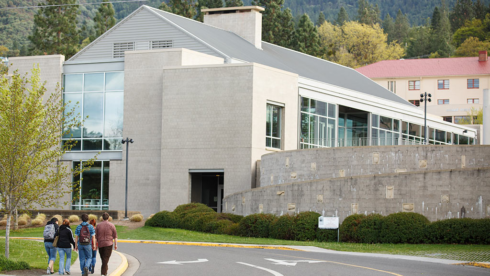
A march on city hall by community members and Southern Oregon University students on April 5 may have helped lead the City of Ashland to reject the proposed homeless exclusionary zone in downtown Ashland.
The council decided to create an ad-hoc Homelessness Steering Committee to come up with solutions to Ashland’s alleged homeless problem.
“There was a lot of pressure from parts of the community to get rid of the exclusionary zone,” said Emery Way, an SOU student who helped organize the event. “I think we had a definitely noticeable impact.”
The protest was organized by Phronesis, a student-led community group that, according to their website, attempts to cultivate a better community by doing everything from chalk drawings to tree planting.
Phronesis was partially responsible for planning the Homelessness Town Hall Meeting in February, which led to the drafting of the proposed ordinances that were heard on April 5.
Members of Phronesis organized the protest when they heard about some of the proposed ordinances, claiming they discriminated against Ashland’s homeless by banning sleeping and sitting on sidewalks, as well as creating an exclusionary zone in downtown Ashland.
“There was a lot of community outcry in creating these proposals,” said Way. “The community had no say in their creation. We want to come up with solutions that will benefit the community.”
Way was not alone in his sentiments. Many people, most of them Ashland residents, made statements against the homeless ordinances during the public forum at the City Council’s meeting on April 5.
“I’m here to support the homeless of this community,” said Randy Dolinger, an Ashland resident. “Why can’t we just enforce the laws that are already on the books?”
“If I treat people with dignity, compassion, and respect, that’s what I get back,” said Sue Crader, who has lived in Ashland since the early 90s. “Whatever you put out there is what you get back.”
“I would be embarrassed of my city if our solution to homelessness was an exclusionary zone,” said Sandra Coyner, also an Ashland resident.
After hearing statements from the public, the Council voted to table the exclusionary zone ordinance and send the other ordinances to the newly formed ad-hoc Homelessness Steering Committee to determine whether or not they should be implemented.
“We are standing for a better community, a more inclusive community,” said Way. “We are not standing against something, we are standing for something.”


